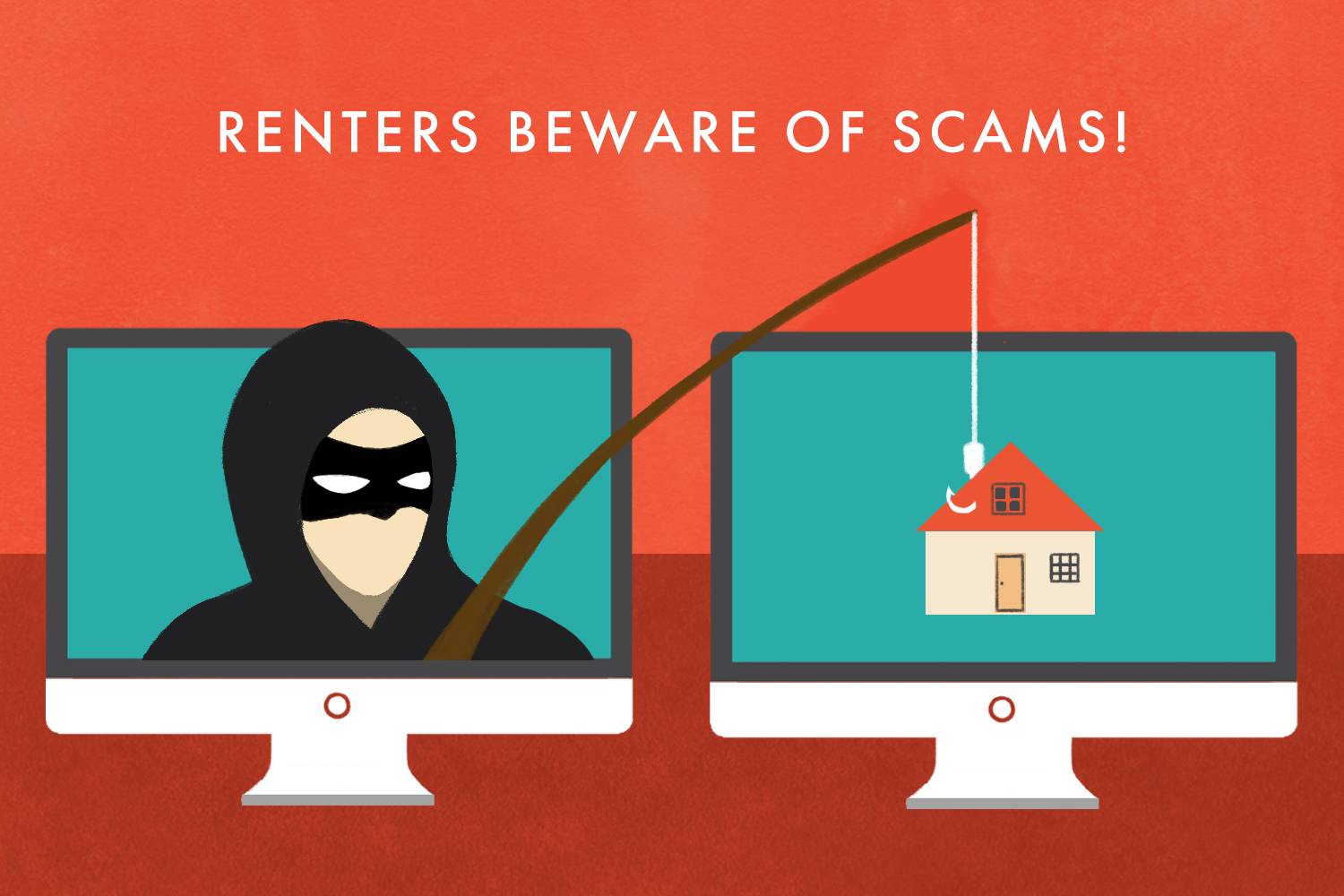
Beware of online rental scams and phishing schemes when browsing for apartment rentals
There are many beautiful apartments in New York City, Paris, London, or wherever you might be searching, and you deserve to see as many of them as possible. Yet at the same time, you deserve protection from scams and complete safety throughout your apartment hunting process.
While rental scams have always existed, today’s digital landscape has transformed how these scams operate. With 93% of renters believing rental scams are common and 90% concerned about falling victim, the threat is real. The increased use of online platforms to advertise rentals means you can fall prey to sophisticated scams that could cost you thousands of dollars and derail your search for weeks.
We want to provide you with at least a base knowledge of how to protect yourself and reduce risk, so please read through the following carefully and consider it as you go on your search:
Common Scams to Watch Out For:
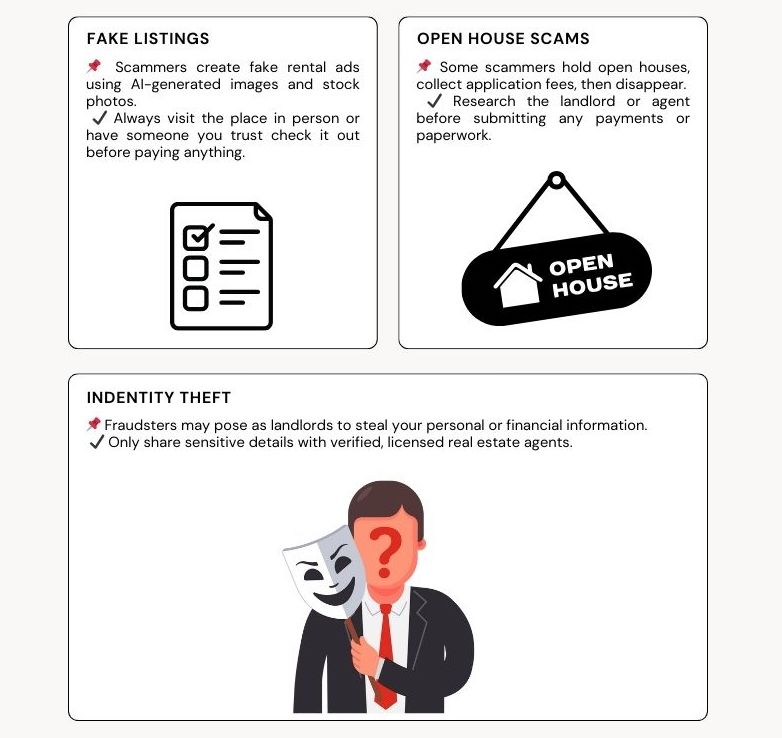
Stay Alert: Common Rental Scams You Need to Know
While tricks and scams certainly aren’t limited to what’s on this list, these represent the most common concerns to watch for. Many of these can happen both online and in real life, with 88% of fraudulent rental listings found on Facebook in 2024, making social media a particular hotspot for scammers. Websites can’t always protect you from these problems, so remain vigilant while staying excited about your search.
- Don’t pay for anything until you or someone you trust implicitly has seen the place in person. False listings are increasingly common, with scammers now using AI-generated fake listings that are becoming harder to detect. With sophisticated technology and readily available stock photos, many people can’t reliably tell the difference between legitimate and fraudulent listings.)
AGENT TIP: Sometimes you can’t view listings in person because you are booking a furnished apartment, roommate share, or vacation rental from out of town or overseas, that’s when it’s particularly important to work with a licensed real estate agency. New York Habitat goes on a listing appointment and checks each property they list making sure it meets listing standards and is legally able to rent for the length of time offered. They also take the apartment photos themselves whenever possible and ensure the pictures advertised are representative of the actual property.
- A common scam is for an open house for an apartment or home to occur, only to disappear after people have paid an application fee or something similar. This is a bit of a more intensive process for a scammer than a false listing, but it occurs often enough to worry about.
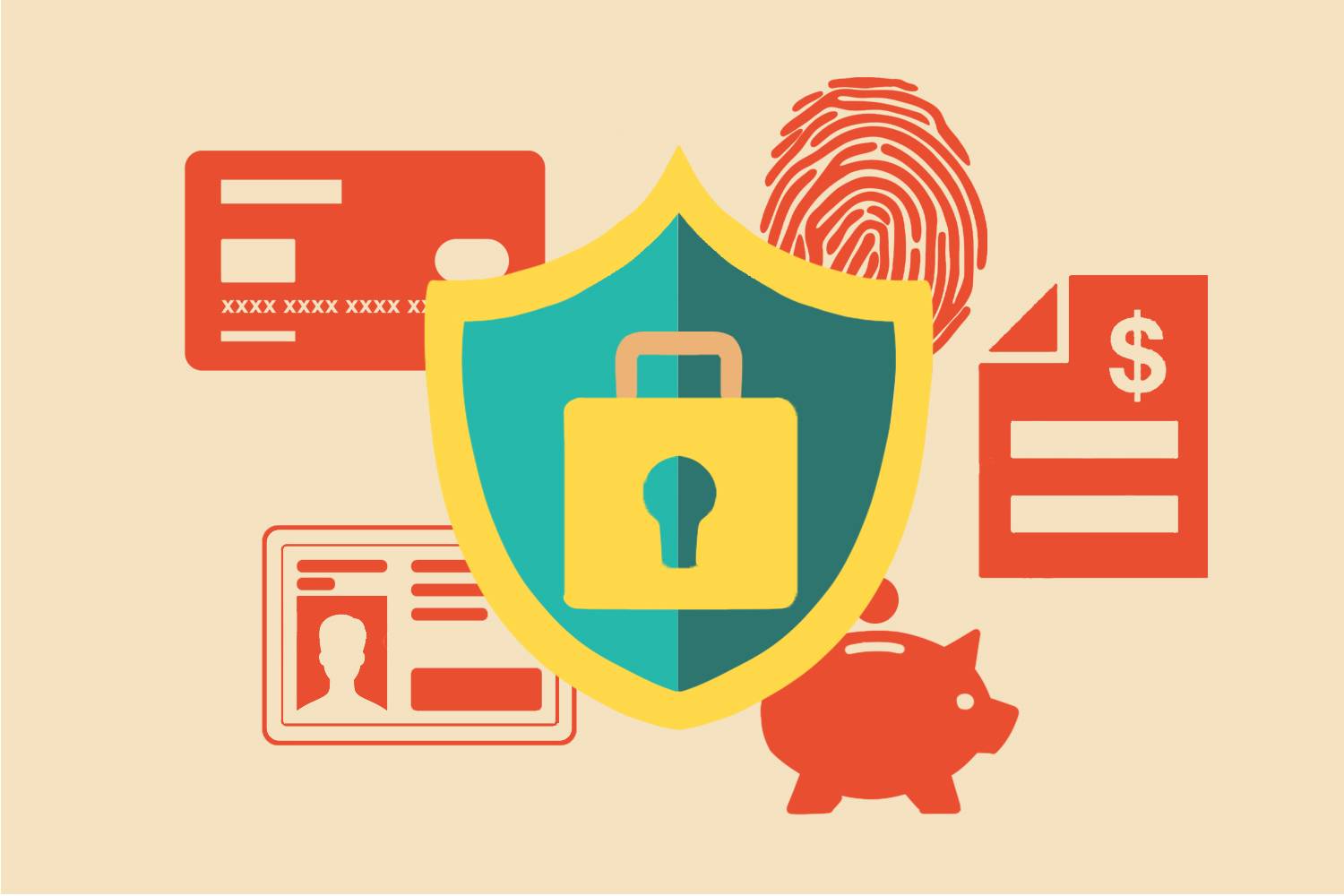
Keep your personal and financial information secure from identity theft by dealing only through a licensed real estate agent or broker
- Be extremely cautious with your personal information until you’ve verified who you’re talking to is legitimate. Identity theft is big business, with rental scams now the #1 online fraud concern for renters. Basic information like your name and email is generally safe to share but keep financial information strictly off-limits unless you’re dealing with a verifiably licensed real estate agent. Remember that 62% of scam victims lost over $500, with 48% losing more than $1,000 — a significant financial blow during an already expensive relocation process.
- Be wary of the bait-and-switch tactic. Less scrupulous agents might post an apartment, vacation rental, or roommate share that seems remarkably affordable, only to later claim it’s “just been rented” but they have similar (more expensive) options to show you. This practice has become more sophisticated, with 6.4% of rental applications found to be fraudulent in 2024. Don’t fall for it — cross-reference listings across multiple platforms to identify inconsistencies and verify agent credentials through official channels. If you already have a trusted agent or website, stay loyal to them. While legitimate apartments do rent quickly in competitive markets, remember the golden rule: if an ad seems too good to be true, it almost certainly is.
- Beware of excessive charges for background checks or deposits. Scammers often inflate these costs significantly, pocketing the difference. According to recent data, these upfront fee scams are particularly common on peer-to-peer rental platforms where oversight is minimal.
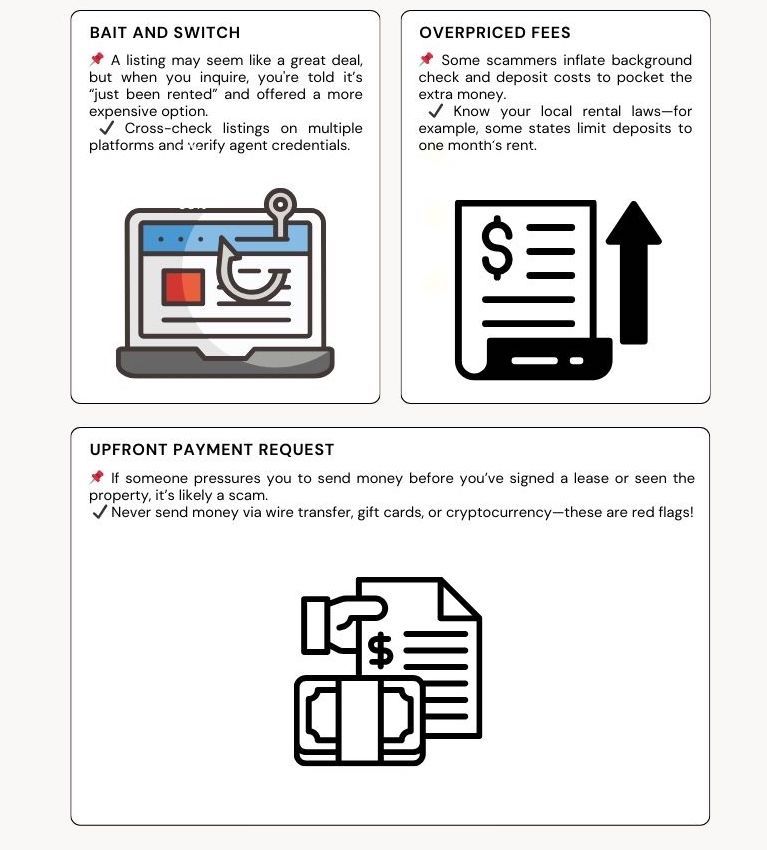
Stay Alert: Common Rental Scams You Need to Know
AGENT TIP: Know your local laws. For example, in July 2019, New York State passed a law prohibiting rental security deposits more than 1 month’s rent. Similar tenant protection laws exist in many major cities and states, so research the regulations specific to your area before making any payments.

Be cautious when someone who is not a real estate agent asks for money upfront
- Be careful of last-minute changes and fees. Scammers or less reputable landlords might try to get you invested and then move forward with increasingly shady actions or expensive fees, thinking you’ll pay them just to move forward. Be wary and consider how they might treat you down the line if you’re already being handled poorly before the paperwork is signed.
Finally, be on the lookout and read up on newer scams if you can. The internet changes rapidly, and while some scams are evergreen, there is always a new cycle to look out for.
What to Look For
Always verify rental professionals’ credentials through official channels. Legitimate agents and firms should have easily accessible registration information on their websites. Check their reputation and any complaints through neutral organizations like the Better Business Bureau. If you can’t find verification information, consider this a serious red flag and proceed with extreme caution or walk away entirely.
AGENT TIP: In NY you can search the New York Department of State website to verify an individual agent or agency. You can check if an agency or agent is licensed in NY here. New York Habitat and its agents/brokers are licensed with the NY State Department of State.
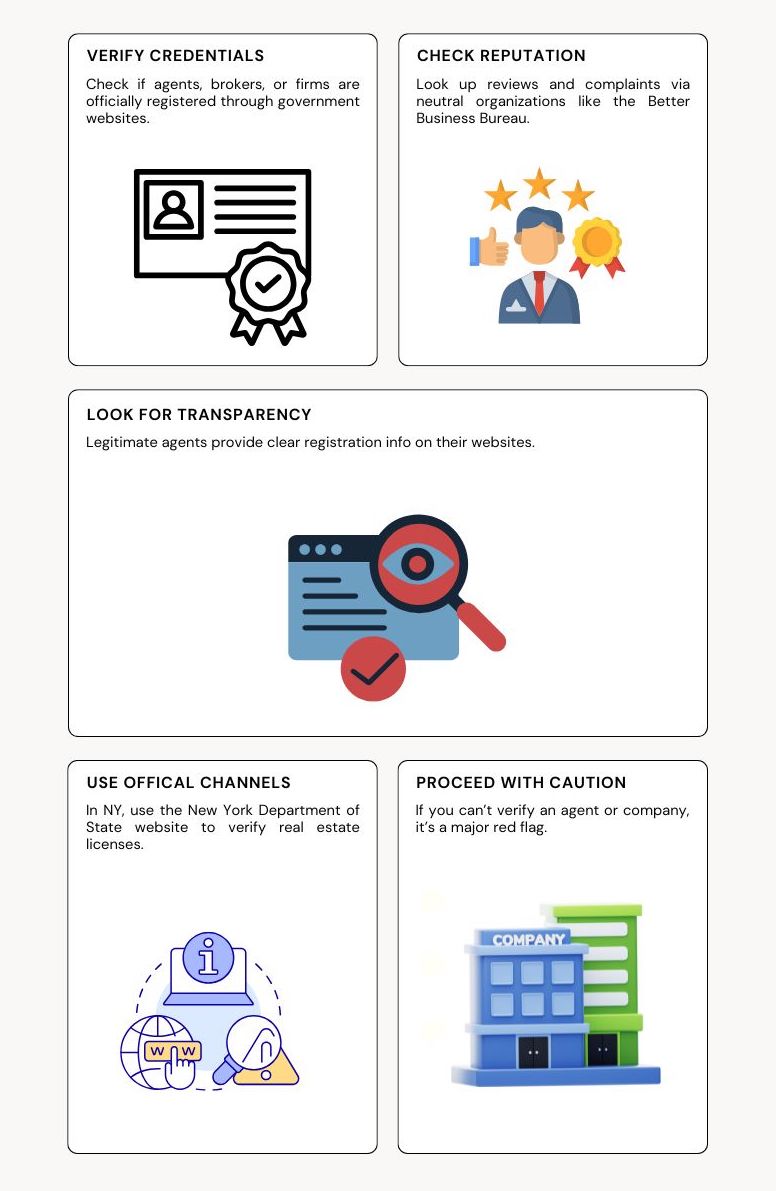
How to Verify Legitimate Agents and Avoid Rental Scams
What to Avoid

Educate yourself on common scams and situations to avoid when renting an apartment online
Just like there are things to look for, there are things to watch out for when renting apartments online as well. Avoid any of the following:
- Vague listings with minimal details. Be wary of AI-generated fake listings that lack specifics to avoid questions. Expect complete information: floor plans, address, amenities, policies, and clear photos.)
- Requests for money before viewing the property. Never pay “holding deposits” unless working with verified agencies.
- Virtual-only transactions without in-person options. Legitimate owners want tenants to see properties—reluctance to schedule viewings is a major red flag.
- If a listing is dishonest in one or two ways, it’s probably hiding other things.
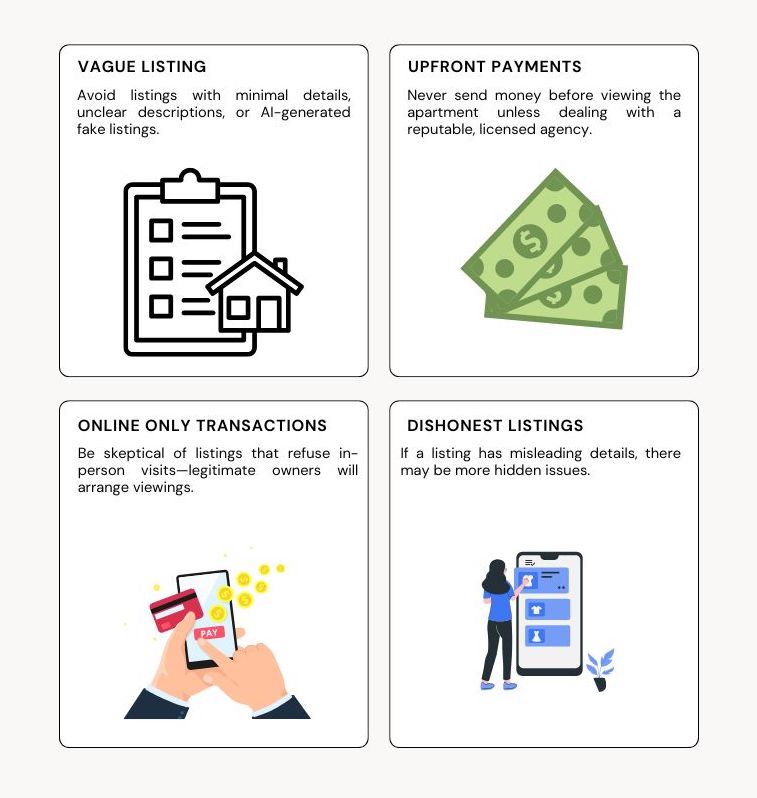
Red Flags to Avoid When Searching for a Rental
How Communication Should Be

A successful online rental requires communication, investigation, documentation and trustworthiness
Professional communication serves as a reliable indicator of legitimacy in the rental market. Legitimate landlords or agents maintain clear, consistent, and transparent communication. You should expect someone who:
- Responds promptly and thoroughly to inquiries.
- Communicates in a professional manner with proper grammar and spelling.
- Maintains a verifiable online presence through company websites, professional listings, or business directories.
- Operates with transparency about their identity and business practices.
Legitimate professionals readily provide verification documentation—business licenses, real estate credentials, property ownership records—within a reasonable timeframe. They understand and respect your need for security and will patiently address verification questions. In today’s digital environment, providing secure document sharing for leases, credentials, and property information is standard practice for legitimate operators. If someone seems evasive about basic verification requests, consider it a significant warning sign.
Finally, every important bit of information should be in writing, and if you can get a digital copy of documents early on, that’s all the better. That being noted, you should always read the specific document you are signing in full to see if there’s any last-minute changes. Don’t worry, they can wait for you.
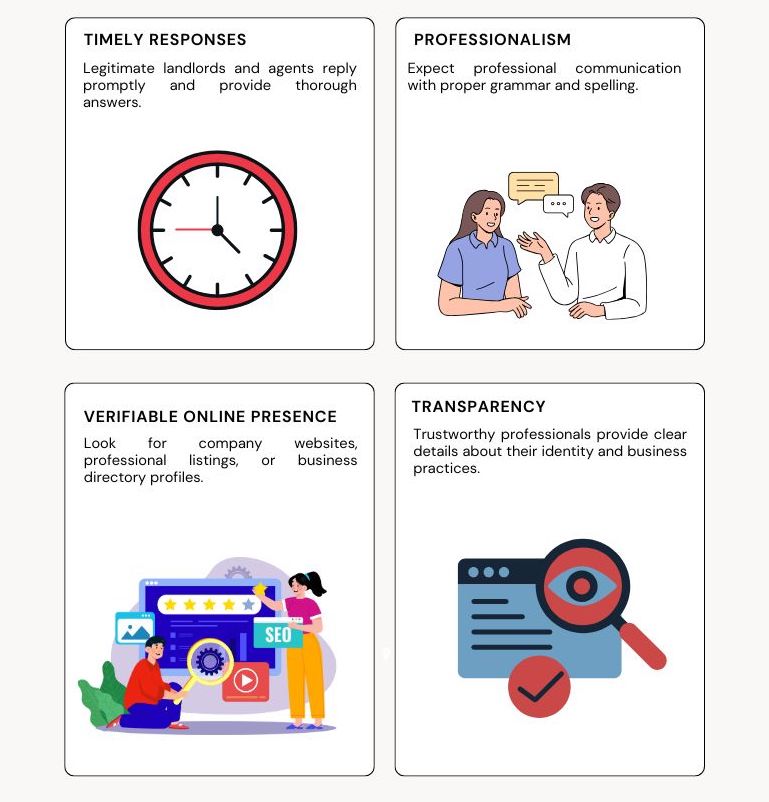
How to Identify Professional Communication in Rental Transactions
General Apartment Hunting Safety Tips
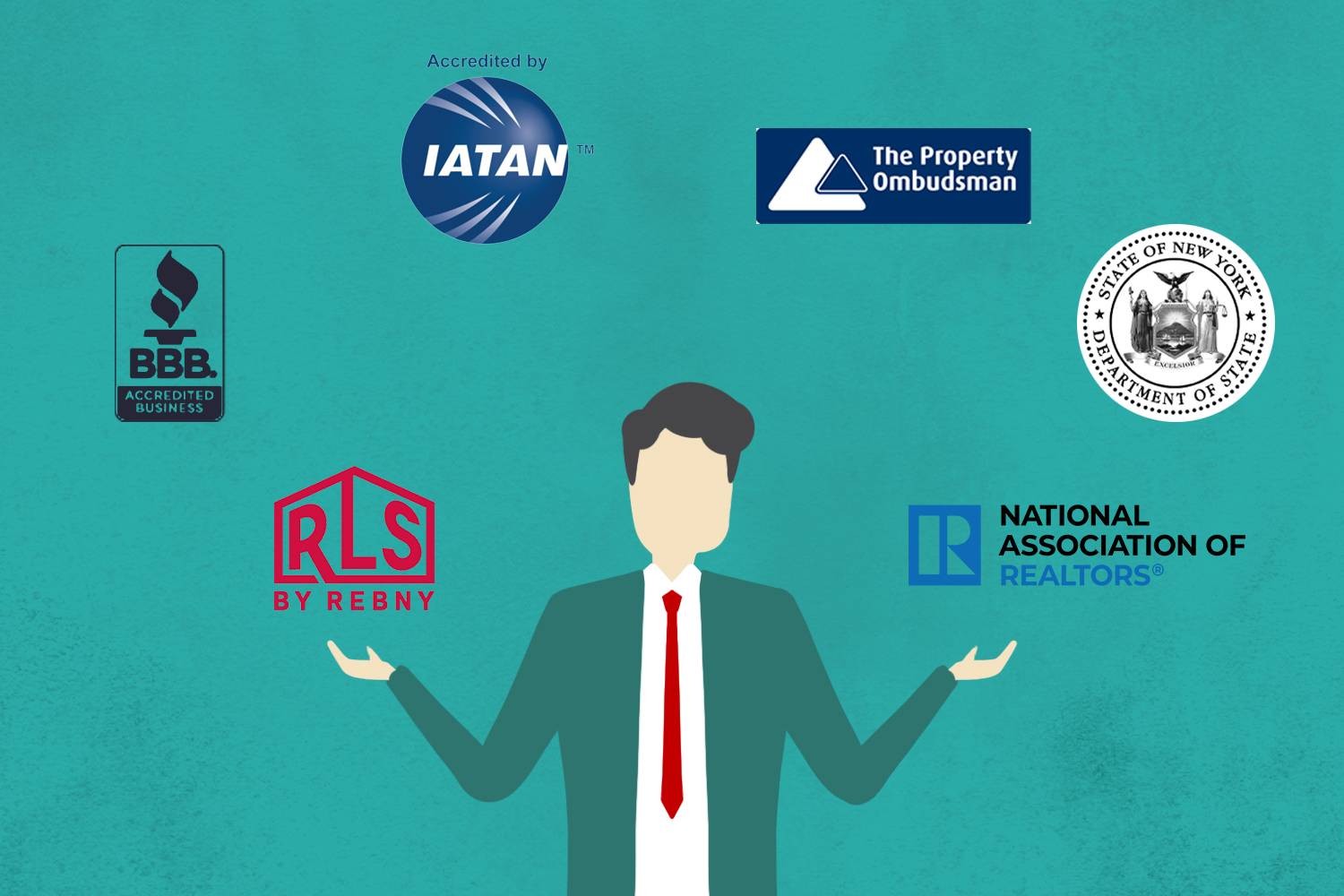
Dealing with licensed professionals connected with IATAN, REBNY, and NY Department of State is worth the fee and peace of mind
Your safety is paramount, which is why you should engage in the following practices during your search:
- Prioritize safety during viewings. Bring someone with you when touring properties, or at minimum, share your location, property address, and agent details with a trusted contact. Enable location sharing on your phone. With rental scams ranking as the top online fraud concern, approach property viewings with the same caution you’d use when meeting any stranger.
- Stick to established rental platforms with built-in security features. Choose sites that verify listings, offer secure payments, and include renter reviews. Avoid unregulated platforms like Facebook Marketplace, where 88% of fraudulent listings appear. While no platform eliminates all risk, verified rental sites significantly reduce your exposure to scams.
- Avoid untraceable payments like cash, cryptocurrency, gift cards, or wire transfers—scammers prefer these methods, unless you are working with a licensed real estate agency bound by the fiduciary duties. Better use traceable options with fraud protection: checks, credit cards, or secure platforms, which can potentially be reversed if fraud is discovered. Legitimate landlords understand this caution and accept secure payment methods.
AGENT TIP: Keep in mind that when dealing with peer-to-peer websites that have a 3rd party collecting or holding money for the landlord, you may be subject to their terms when it comes to disputes over deductions or forfeiture of security deposits, giving up your right to take the dispute to court.
- Trust your instincts. If something feels off to you, don’t let your eagerness to find a new apartment make you ignore those feelings. They’re usually right. This is equally important online and offline.
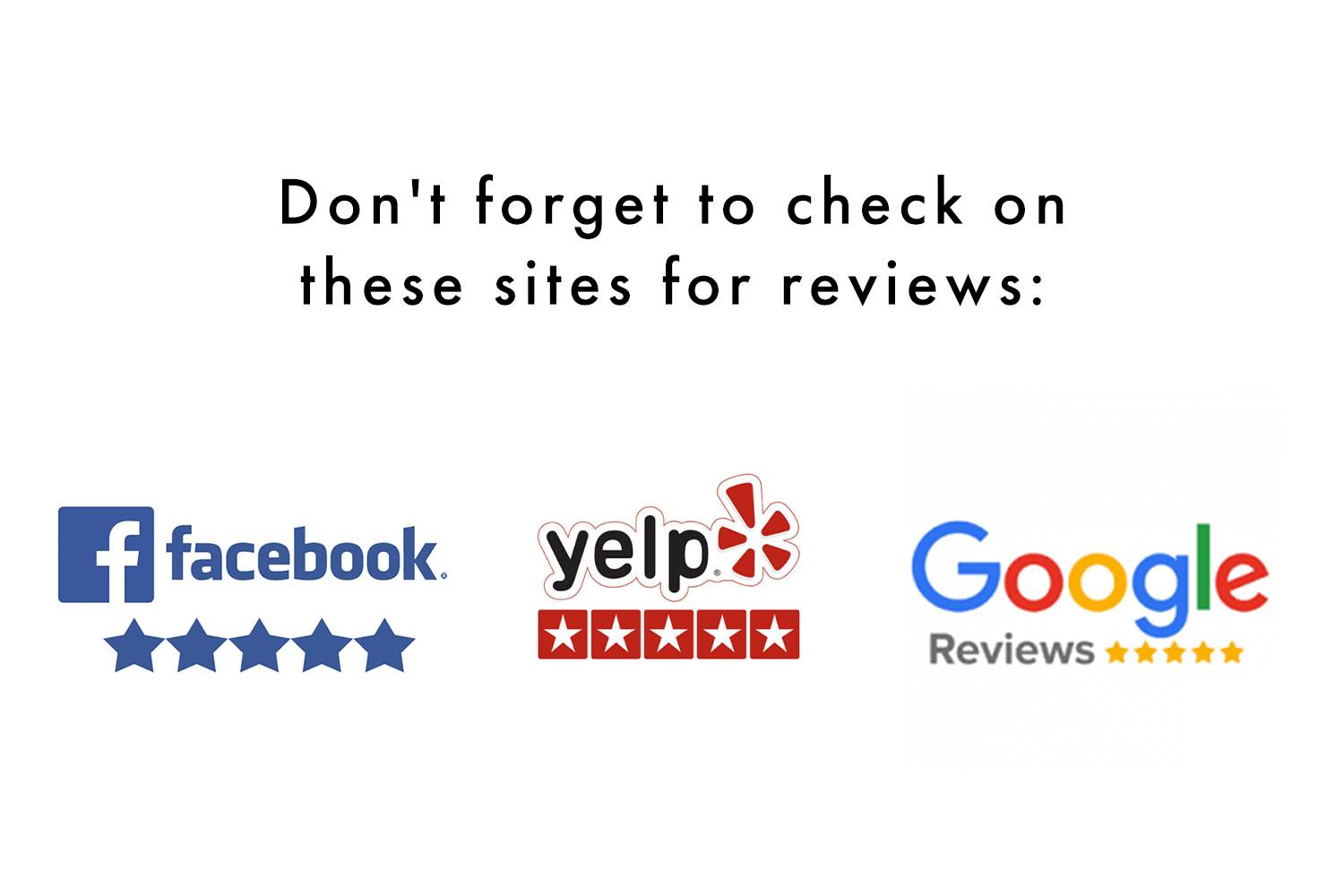
Check out what other people have to say about a company or website on online review sites
Finding your new home should be exciting, not dangerous. With 93% of renters concerned about scams and many victims losing substantial money, vigilance is crucial.
Legitimate landlords’ welcome questions, encourage viewings, provide documentation, and respect verification needs. Quality platforms like New York Habitat prioritize security and transparency. Trust your instincts—if something feels wrong, move on. The competitive rental market may create urgency, but patience and verification are your best protection. Another apartment will come along; lost money rarely returns.
New York Habitat wish you a safe, successful search and a home that brings complete security.



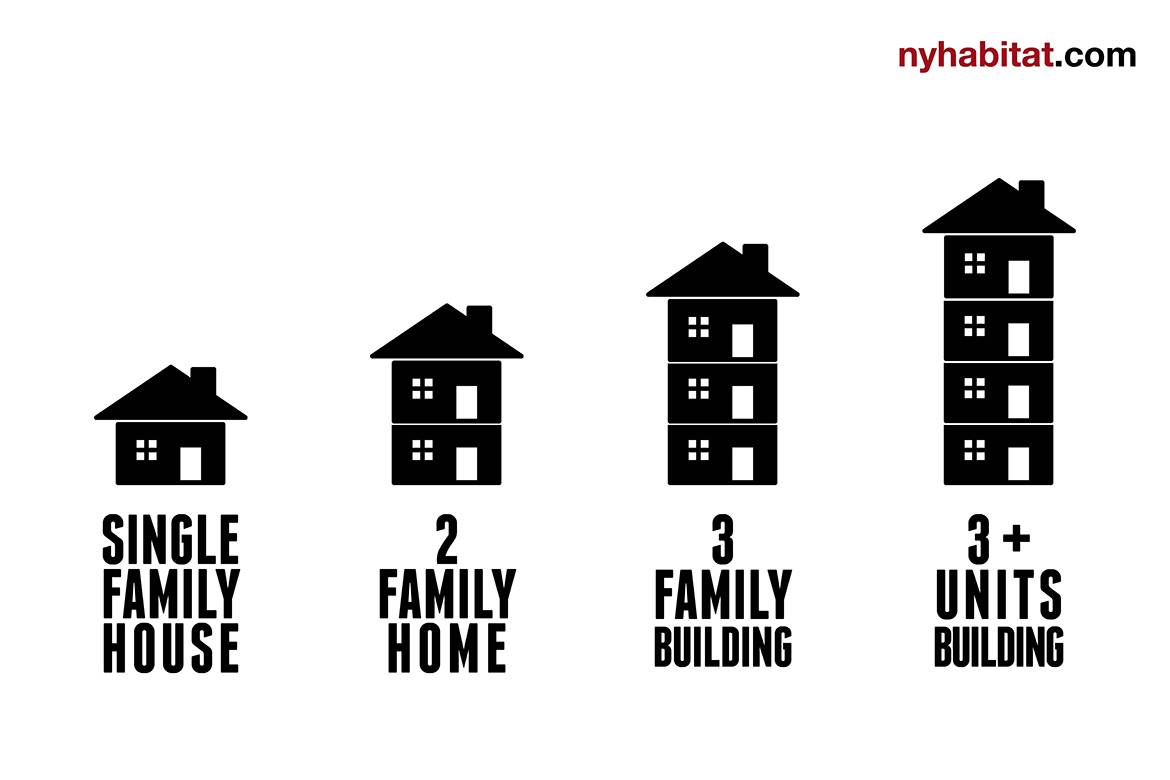

Leave a Reply